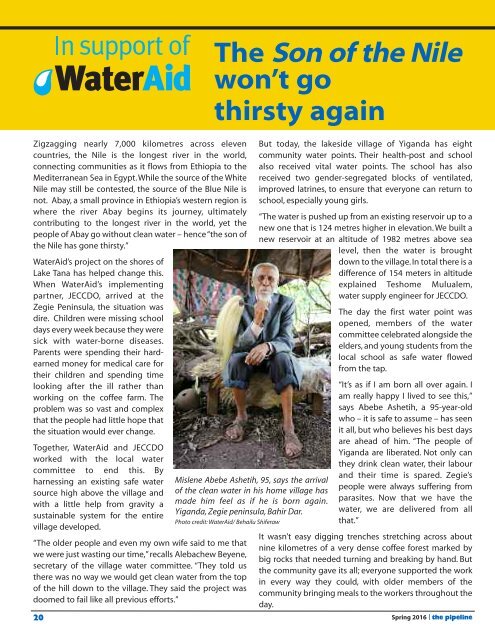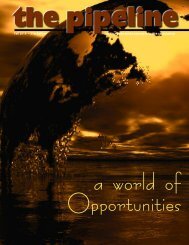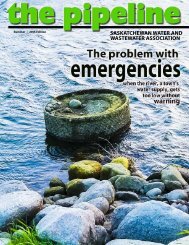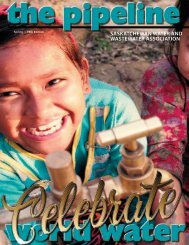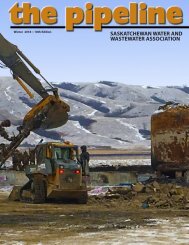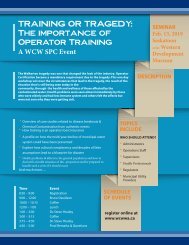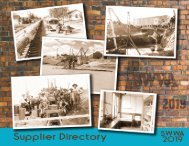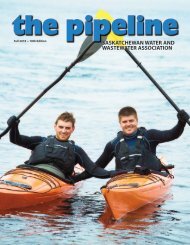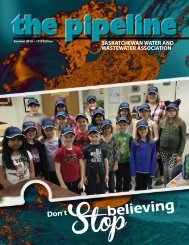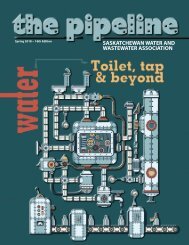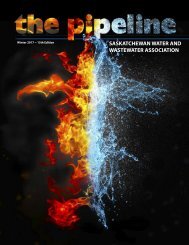The Pipeline
Spring 2016
Spring 2016
You also want an ePaper? Increase the reach of your titles
YUMPU automatically turns print PDFs into web optimized ePapers that Google loves.
<strong>The</strong> Son of the Nile<br />
won’t go<br />
thirsty again<br />
Teshome Mulualem, water supply engineer for<br />
WaterAid’s implementing partner JECCDO, right,<br />
shows switch controller, Kasahun Workineh, how to<br />
manage the switch boards. Yiganda, Zegie<br />
peninsula, Bahir Dar.<br />
Photo credit: WaterAid/ Behailu Shiferaw<br />
Zigzagging nearly 7,000 kilometres across eleven<br />
countries, the Nile is the longest river in the world,<br />
connecting communities as it flows from Ethiopia to the<br />
Mediterranean Sea in Egypt. While the source of the White<br />
Nile may still be contested, the source of the Blue Nile is<br />
not. Abay, a small province in Ethiopia’s western region is<br />
where the river Abay begins its journey, ultimately<br />
contributing to the longest river in the world, yet the<br />
people of Abay go without clean water – hence “the son of<br />
the Nile has gone thirsty.”<br />
WaterAid’s project on the shores of<br />
Lake Tana has helped change this.<br />
When WaterAid’s implementing<br />
partner, JECCDO, arrived at the<br />
Zegie Peninsula, the situation was<br />
dire. Children were missing school<br />
days every week because they were<br />
sick with water-borne diseases.<br />
Parents were spending their hardearned<br />
money for medical care for<br />
their children and spending time<br />
looking after the ill rather than<br />
working on the coffee farm. <strong>The</strong><br />
problem was so vast and complex<br />
that the people had little hope that<br />
the situation would ever change.<br />
Together, WaterAid and JECCDO<br />
worked with the local water<br />
committee to end this. By<br />
harnessing an existing safe water<br />
source high above the village and<br />
with a little help from gravity a<br />
sustainable system for the entire<br />
village developed.<br />
“<strong>The</strong> older people and even my own wife said to me that<br />
we were just wasting our time,” recalls Alebachew Beyene,<br />
secretary of the village water committee. “<strong>The</strong>y told us<br />
there was no way we would get clean water from the top<br />
of the hill down to the village. <strong>The</strong>y said the project was<br />
doomed to fail like all previous efforts.”<br />
20<br />
Mislene Abebe Ashetih, 95, says the arrival<br />
of the clean water in his home village has<br />
made him feel as if he is born again.<br />
Yiganda, Zegie peninsula, Bahir Dar.<br />
Photo credit: WaterAid/ Behailu Shiferaw<br />
But today, the lakeside village of Yiganda has eight<br />
community water points. <strong>The</strong>ir health-post and school<br />
also received vital water points. <strong>The</strong> school has also<br />
received two gender-segregated blocks of ventilated,<br />
improved latrines, to ensure that everyone can return to<br />
school, especially young girls.<br />
“<strong>The</strong> water is pushed up from an existing reservoir up to a<br />
new one that is 124 metres higher in elevation. We built a<br />
new reservoir at an altitude of 1982 metres above sea<br />
level, then the water is brought<br />
down to the village. In total there is a<br />
difference of 154 meters in altitude<br />
explained Teshome Mulualem,<br />
water supply engineer for JECCDO.<br />
<strong>The</strong> day the first water point was<br />
opened, members of the water<br />
committee celebrated alongside the<br />
elders, and young students from the<br />
local school as safe water flowed<br />
from the tap.<br />
“It’s as if I am born all over again. I<br />
am really happy I lived to see this,”<br />
says Abebe Ashetih, a 95-year-old<br />
who – it is safe to assume – has seen<br />
it all, but who believes his best days<br />
are ahead of him. “<strong>The</strong> people of<br />
Yiganda are liberated. Not only can<br />
they drink clean water, their labour<br />
and their time is spared. Zegie’s<br />
people were always suffering from<br />
parasites. Now that we have the<br />
water, we are delivered from all<br />
that.”<br />
It wasn’t easy digging trenches stretching across about<br />
nine kilometres of a very dense coffee forest marked by<br />
big rocks that needed turning and breaking by hand. But<br />
the community gave its all; everyone supported the work<br />
in every way they could, with older members of the<br />
community bringing meals to the workers throughout the<br />
day.<br />
Spring 2016 | the pipeline<br />
<strong>The</strong> water flow needs continuous monitoring, as sometimes the pressure can<br />
be too much for the pipes and gate valves. A young man named Kasahun was<br />
one of many trained by JECCDO in how to operate the control boards. He and<br />
his colleagues manage how much water is pushed up through the boosting<br />
station and into the community at particular times, ensuring there is a<br />
constant reliable source of safe water.<br />
“We will pay the salaries for the people who look after the structures. <strong>The</strong>y are<br />
trained, our children have good brain. Nobody is born with plumbing skills. It’s<br />
an acquired skill; if you train our children, they will do it. We won’t need more<br />
help,” said Abebe.<br />
With the support of WaterAid and<br />
JECCDO the village of Yiganda now has<br />
a sustainable source of safe water for<br />
years to come, ensuring the son of the<br />
Nile won’t go thirsty again.<br />
. . . “It’s as if I am born all<br />
over again. . . “<br />
Birhan Workie, 7, washes at the new water<br />
point in her village Yiganda, Zegie<br />
peninsula, Bahir Dar.<br />
Photo credit: WaterAid/ Behailu Shiferaw<br />
Above - Students at Yiganda Full-cycle Elementary<br />
School now have a safe water point where they can<br />
clean their hands and drink safe water while<br />
throughout the school day. Yiganda, Zegie<br />
peninsula, Bahir Dar.<br />
Photo credit: WaterAid/ Behailu Shiferaw<br />
Below - Yiganda Full-Cycle Elementary School has<br />
now got a four-door ventilated improved pit latrine<br />
for boys and another similar block for girls. Yiganda,<br />
Zegie peninsula, Bahir Dar. Photo credit: WaterAid/<br />
Behailu Shiferaw<br />
Students at Yiganda Fullcycle<br />
Elementary School not<br />
only drink at the school but<br />
also take some home in case<br />
the community water point is<br />
locked for the night by the<br />
time they get home. Yiganda,<br />
Zegie peninsula, Bahir Dar.<br />
Photo credit: WaterAid/ Behailu<br />
Shiferaw<br />
the pipeline | Spring 2016 21


